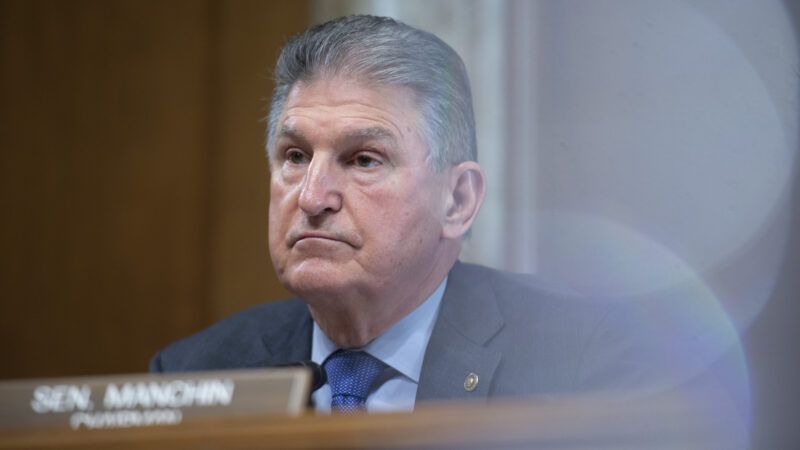Joe Manchin on Biden’s Wealth Tax:
Joe Manchin on Biden's Wealth Tax: 'You Can't Tax Something That's Not Earned.'
Joe Manchin keeps saying out loud the part that Joe Biden would rather keep quiet.

(Bonnie Cash / CNP / SplashNews/Newscom)
Ever since Joe Biden entered the White House, he's had a Joe Manchin problem. Most accounts of Biden's presidency cast this as a problem with Manchin's unwillingness to go along with Biden's agenda. Democrats hold exactly 50 seats in the Senate, and thus need every Democratic senator to pass a party-line vote; Manchin, the Senate's most centrist Democrat, has consistently resisted.
But the problem is not only that Manchin is withholding his vote. It's that Manchin keeps bluntly and accurately describing the problems with Biden's policy proposals. To twist the Twitter-cliche, Joe Manchin keeps saying out loud the part that Joe Biden would rather keep quiet.
Take, for example, Biden's recently proposed wealth tax, dubbed the Billionaire Minimum Income Tax, which taxes realized and unrealized gains on households worth at least $100 million. Under this scheme, non-cash holdings could be taxed based on an assessed change in value. So a home or property that increased in value but was not sold could generate a federal tax obligation, even though the owner saw no money from the increase.
The administration has rather dubiously described the tax as "a prepayment of tax obligations these households will owe when they later realize their gains." This is a stretch at best, an intentional abuse of language for political reasons at worst.
But when asked about the tax yesterday, Manchin engaged in no such obfuscation. "You can't tax something that's not earned. Earned income is what we're based on," he told The Hill.
You can't tax something that's not earned.
One could quibble with the phrase "can't." A government could certainly try, as many countries have—although almost all have ditched their wealth taxes, partly because they turn out to be quite difficult to administer.
But Manchin's underlying point is quite clear. The Biden administration is proposing taxing a kind of income that is not, in any real sense, income. The proposal treats money that has not been earned, but might hypothetically be earned at some future point, as money that an individual already possesses. It's an attempt to tax money that people haven't made yet, and might not make at all.
Manchin has made admirably direct statements like this all throughout Biden's presidency, frustrating the Biden agenda in the process. In a lengthy statement last September, he laid out his opposition to Biden's spending bill, dubbed Build Back Better, which, among other things, expanded health care programs without addressing looming gaps in Medicare's financing.
"Spending trillions more on new and expanded government programs," Manchin said, "when we can't even pay for the essential social programs, like Social Security and Medicare, is the definition of fiscal insanity." In the same statement, he said he opposed overspending in the wake of the trillions in deficit-financed pandemic aid, and warned that Democrats were foolish to believe that trillions of dollars worth of additional federal spending would not further increase inflation.
Months later, Manchin once again blasted the Build Back Better plan, which had contorted in an attempt to please both Manchin and progressive Democrats. The headline price tag had been reduced, but in large part by artificially shortening the funding lengths for the various programs, even programs Democrats hoped would remain permanent.
Once again, Manchin was not only opposed, but cleareyed about the bill's various structural ruses. "What I see are shell games," he said. "Budget gimmicks," that hid the true cost of the plan.
These were the sorts of inconvenient notions that Biden (and Democrats in Congress) didn't want to acknowledge. Manchin just…said them.
So it was no surprise that by the end of last year, Manchin had effectively killed Build Back Better, or at least put to rest the idea that he'd support anything like the versions that had been floated.
He was also blunt in a way that defeated the White House's shifty messaging.
Throughout the year, the Biden administration repeatedly sought to maintain the pretense that the spending bill was nearly a done deal, and that Manchin was on board with the general idea, even if some specifics still needed to be negotiated. Biden even gave an address premised on the idea that the spending bill was a fait accompli.
"After months of tough and thoughtful negotiations," Biden said in October, Democrats had reached agreement on a "historic economic framework." They obviously hadn't, yet nearly two months later, Biden was still insisting that the West Virginia senator was more or less on board, saying "Senator Manchin has reiterated his support for Build Back Better funding at the level of the framework plan I announced in December."
Once again, Manchin responded bluntly and directly. "I cannot vote to continue with this piece of legislation. I just can't," he said just before Christmas. "This is a 'no' on this legislation."
This is a no on this legislation.
There is, perhaps, some wiggle room in this statement, which leaves open the possibility that Manchin will eventually support something called Build Back Better, or something that includes some scattered elements from the Build Back Better framework.
But it was clear in a way that Biden was not. Once again, Manchin had shed light on Biden's attempts at verbal misdirection, revealing how Biden's plans rest on messaging designed to obfuscate rather than clarify. Manchin's penchant for transparency is a problem for Biden, but a boon to the public.




Post a Comment